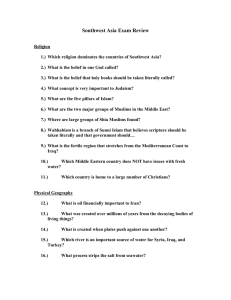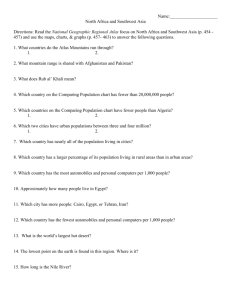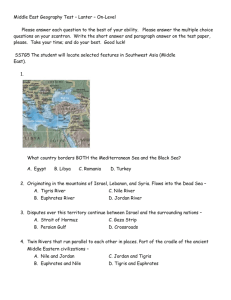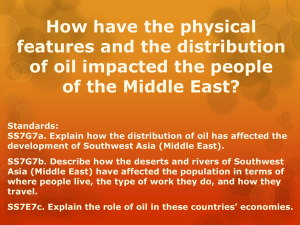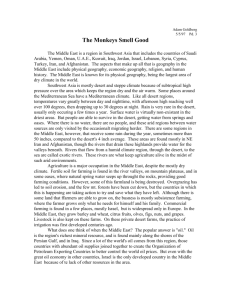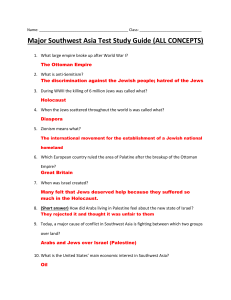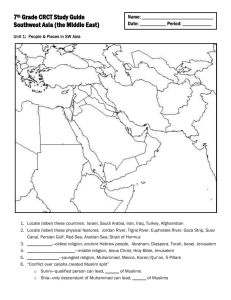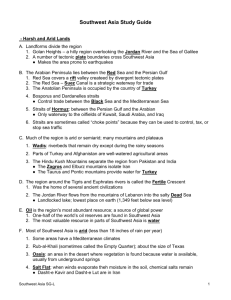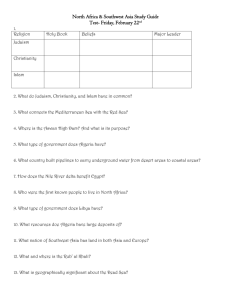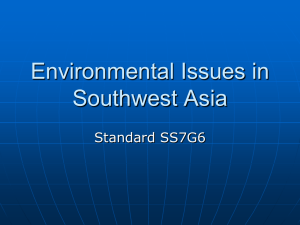Southwest and Central Asia Background
advertisement
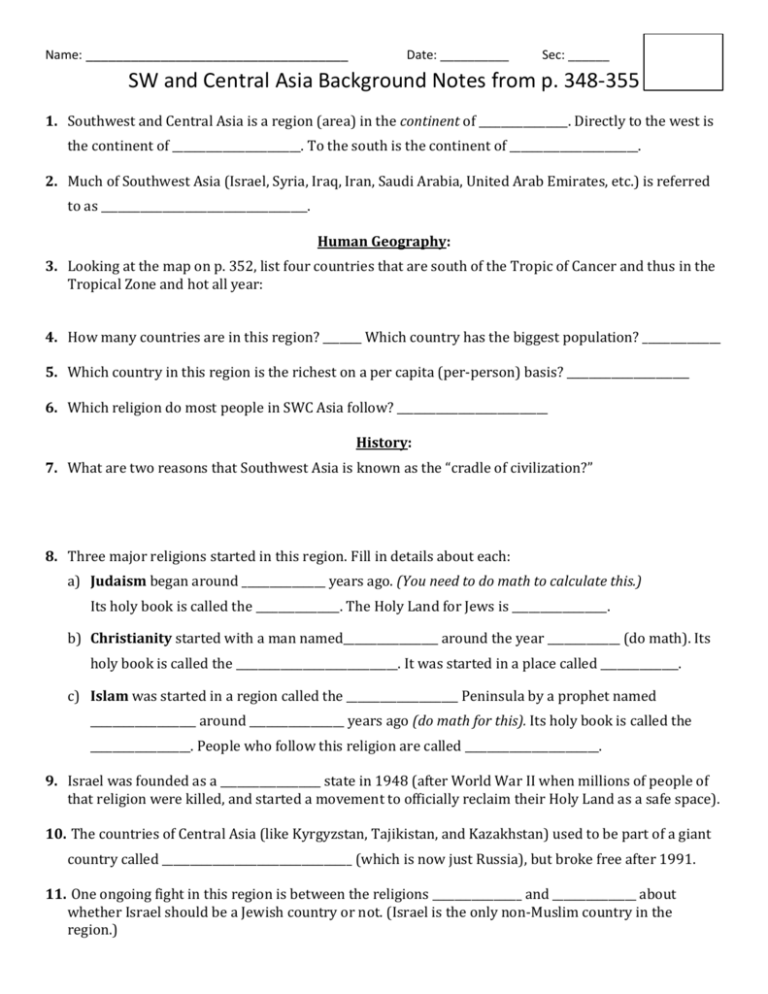
Name: ___________________________________ Date: __________ Sec: ______ SW and Central Asia Background Notes from p. 348-355 1. Southwest and Central Asia is a region (area) in the continent of ________________. Directly to the west is the continent of _______________________. To the south is the continent of _______________________. 2. Much of Southwest Asia (Israel, Syria, Iraq, Iran, Saudi Arabia, United Arab Emirates, etc.) is referred to as _____________________________________. Human Geography: 3. Looking at the map on p. 352, list four countries that are south of the Tropic of Cancer and thus in the Tropical Zone and hot all year: 4. How many countries are in this region? _______ Which country has the biggest population? ______________ 5. Which country in this region is the richest on a per capita (per-person) basis? ______________________ 6. Which religion do most people in SWC Asia follow? ___________________________ History: 7. What are two reasons that Southwest Asia is known as the “cradle of civilization?” 8. Three major religions started in this region. Fill in details about each: a) Judaism began around _______________ years ago. (You need to do math to calculate this.) Its holy book is called the _______________. The Holy Land for Jews is _________________. b) Christianity started with a man named_________________ around the year _____________ (do math). Its holy book is called the _____________________________. It was started in a place called ______________. c) Islam was started in a region called the ____________________ Peninsula by a prophet named ___________________ around _________________ years ago (do math for this). Its holy book is called the __________________. People who follow this religion are called ________________________. 9. Israel was founded as a __________________ state in 1948 (after World War II when millions of people of that religion were killed, and started a movement to officially reclaim their Holy Land as a safe space). 10. The countries of Central Asia (like Kyrgyzstan, Tajikistan, and Kazakhstan) used to be part of a giant country called __________________________________ (which is now just Russia), but broke free after 1991. 11. One ongoing fight in this region is between the religions ________________ and _______________ about whether Israel should be a Jewish country or not. (Israel is the only non-Muslim country in the region.) 12. In some Muslim countries, there are ongoing arguments between __________________ and ________________, two types of Islam. Population: 13. Around _____________________ people live in SWC Asia, which makes up ______% of the world’s population. 14. SWC Asia has one of the __________________________ growing and _________________ populations in the world, with the majority of its people under the age of ___________. 15. What percent of people in SWC Asia are Muslim (practice the religion Islam)? _______ What percentage are the specific type of Muslim called Sunni? _______% to _______%. 16. The capital city of Israel, which is holy for Islam, Christianity, AND Judaism is: _________________________ 17. In SWC Asia, ______% of people live in urban areas (cities) and ________% in rural (countryside), but every year the population is moving more and more to ________________ areas. 18. Look at the diagram at the bottom of page 354 that shows how fast the population is growing in this region. How many times bigger was the population in 2008 than 1950? __________________ times bigger. Economic Activity: 19. Why is oil (also called petroleum) so important in this region? 20. Why is water so important in this region? 21. Fossil fuels are natural resources from the Earth like coal, gas, and oil that humans use for energy. Southwest Asia has the world’s largest deposits of the fossil fuel called __________, which has made countries with a lot of this very ___________. Central Asia has an important fossil fuel called __________. Oil in Southwest Asia (p. 357-363): 22. What reaction (1-4 words) do you have about the photos on p. 356 of how Dubai changed due to oil money? 23. Most people in Southwest Asia are __________, or people who speak Arabic. (p. 358) 24. Looking at the map on p. 359, list the 10 countries that posses half the world’s known oil reserves. 25. What is GDP (Gross Domestic Product)? 26. What is GDP per capita? (Note: For the U.S.A. it is $53,000) 27. What is HDI (Human Development Index)? Southwest and Central Asia is circled on this world map. Label the 7 continents: Here is an alphabetical list of the countries in Southwest and Central Asia: 1. Afghanistan 2. Armenia 3. Azerbaijan 4. Bahrain 5. Cyprus 6. Georgia 7. Iran 8. Iraq 9. Israel 10. Jordan 11. Kazakhstan 12. Kuwait 13. Kyrgyzstan 14. Lebanon 15. Oman 16. Pakistan 17. Qatar 18. Saudi Arabia 19. Syria 20. Turkey 21. Turkmenistan 22. United Arab Emirates 23. Uzbekistan 24. Tajikistan 25. Yemen Below is a cheat sheet of some of the biggest conflicts right now in Southwest and Central Asia: Syria – There has been a major civil war going on since 2011 in which around 300,000 people have been killed and 11 million people displaced (forced to move). Rebels are fighting the dictatorship of the leader, Bashar al-Assad, but now ISIS, a violent terrorist group, has started getting involved. Iraq – In 2003 the U.S. invaded this country and threw out the leader, Saddam Hussein, saying he had “weapons of mass destruction.” These weapons were never found, and some suspect the U.S. invaded for other reasons such as oil. Since then, Iraq has fallen into chaos, and the violent terrorist group ISIS is taking over sections. Iran - This country has been an “enemy” of the U.S. since 1979 when the Iranian revolution threw out the “puppet” government supported by the U.S. Recently, however, President Obama has started to reopen connections with Iran, saying we can connect with each other again if Iran stops building nuclear weapons. Afghanistan – The U.S. invaded this country in 2001 after Sept. 11 and threw out the violently repressive Taliban (who don’t believe women should get an education). Now that the U.S. troops have left, however, the country has become chaotic and violent, and the Taliban may be coming back. Israel – This is currently the only Jewish country in the region (almost all the others are Muslim), and was founded in 1948 after WWII when millions of Jews were killed in the Holocaust and others started a movement to return to their Holy Land. Israel is very upsetting for Palestinians (and many other Arabs) who feel their land was taken. Yemen – A civil war has recently started there, and Saudi Arabia (a rich and stable oil-producing country on the Arabian Peninsula which is considered a U.S. friend) is starting to get involved.
